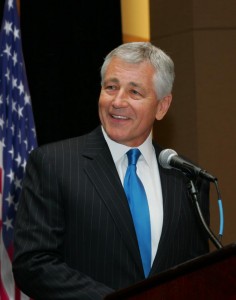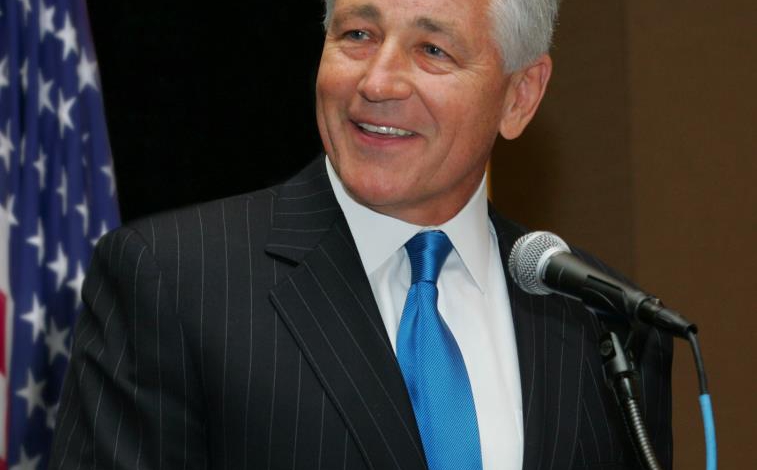 WASHINGTON � The trial balloon for the next secretary of defense barely lifted off before the darts started zipping at it, from the left and the right.
WASHINGTON � The trial balloon for the next secretary of defense barely lifted off before the darts started zipping at it, from the left and the right.The notion: Chuck Hagel, a former Republican senator from Nebraska, might be a good pick to fill the shoes of the current secretary, Leon Panetta, when he eventually leaves.
The problems: Log Cabin Republicans used a 14-year-old quote to say Hagel was anti-gay. Some Israel backers used a 2006 quote to question his support of that nation, and a few even said he was an anti-Semite. Neo-conservatives questioned whether he�d be too soft on Iran and Hamas.
Still, while the attacks might seem a bit intense on an avowed moderate, experts who study U.S. security agree that the easy part for the next secretary will be getting the job.
�Let�s not even pretend we�re going to get a secretary who can keep the force from going hollow,� said James Jay Carfano, an expert on defense at the Heritage Foundation, a conservative think tank. �For the next couple of years, this job just isn�t going to be a lot of fun.�
Hollowing out the force means that while it might look fine, it�s not ready. Either training was cut too far back, or weapons systems delayed too much, or maintenance overlooked, or the force reduced too far. Which means the lack of fun for the next secretary will begin where everything begins these days, with the budget. The root problem is the general mess of the federal budget. Defense spending represents about half the discretionary budget. Even with strong allies, cuts are inevitable.
Defense took deep cuts this year, and experts believe that�s a trend that will continue for years to come.
It�s not merely a shrinking budget that will pose the greatest challenge in the coming years. Defense experts note the range of pressing concerns for the next secretary will run from how to best wrap up the war in Afghanistan, what do about Iran�s potential nuclear threat, what to do with North Korea and how best to pursue the next step in the war on terror.
�The United States needs a secretary who can deal with global crisis in a world of fiscal uncertainty,� said Anthony Cordesman, a defense expert at Washington�s Center for Strategic and International Studies. �Money can disrupt everything.�
For instance, Cordesman said that it�s increasingly likely that the next secretary will have to oversee either further containment or even military action in Iran. The secretary also will certainly have to oversee drawing down in Afghanistan.
Both are very costly items.
In times of shrinking budgets, that probably means needing more support from allies. As the U.S. has done most of the military spending until now, that means restructuring alliances. For instance, in NATO, only France and United Kingdom now project power. Even those nations spend a much smaller percentage of their Gross National Product on defense than the United States.
Shrinking budgets mean weapons systems could be cut, and bases closed, and the force reduced. Or it means doing less, or least postponing doing more.
Michael O�Hanlon, defense expert at Washington�s Brookings Institution, cautions against the kicking the can down the road strategy.
�For instance, the magnitude of the stakes in Iran are much higher than most people want to think,� he said. At the same time, the rise and uncertain nature of the future of relations with China mean the �Asian pivot� of focusing forces made perfect sense.
�No matter who ends up in that position, they�re going to need to take a nuanced approach and focus on the long term,� he said. As money dries up, overwhelming force is less of an option.
At this point, only three names are being regularly talked about as next in line at the Pentagon. Hagel�s has attracted the most attention. Hagel is a decorated veteran with respect among many in the miliary community. Still, the notion of a secretary of defense who classified the Iraq war as a blunder attracts comment. He�s a trusted adviser to President Barack Obama.
Michele Flournoy, a former undersecretary of defense for policy, is another trusted adviser thought to be a likely candidate as Panetta�s replacement. She knows the building well, with a thorough understanding of the issues the next secretary will face. As a plus, she�s a woman, and no woman has ever headed defense.
The third name bandied about is the current No. 2 at the Pentagon, Ashton Carter, who also served as an undersecretary under President Bill Clinton.
By The Olympian
The Iran Project is not responsible for the content of quoted articles.











